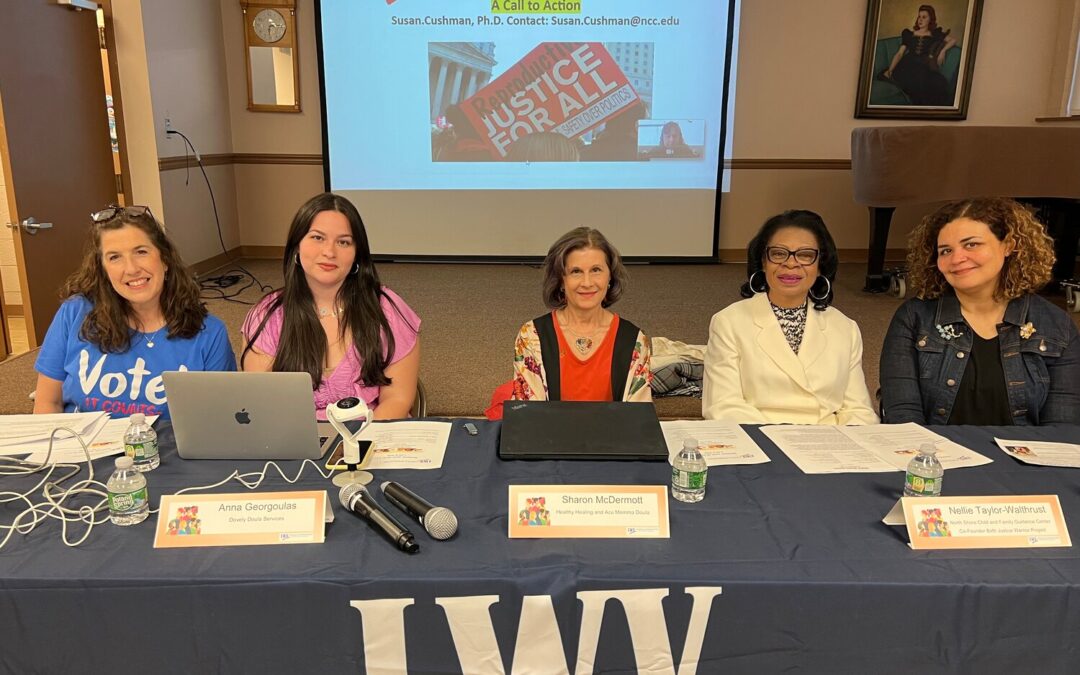
Reproductive rights and equality for all
The Freeport Memorial Library hosted a detailed, lively panel discussion last Friday, connecting women’s reproductive rights to the New York State Equal Rights Amendment.
The program was organized by the League of Women Voters of Central Nassau.
On Nov. 5, voters will have an opportunity to enshrine a revised version of the state amendment in law, by approving it in the voting booth.
New York currently has an Equal Rights Amendment that prohibits discrimination based on race, color, creed or religion. The revised amendment adds more protected categories: ethnicity, national origin, age, disability and sex.
The category of sex is broken down into “sexual orientation, gender identity, gender expression, pregnancy, pregnancy outcomes, and reproductive health care and autonomy.”
Abortion access may be the issue that most readily comes to mind under the heading “reproductive health care,” but it is not the only concern for women.
Nondiscriminatory treatment before, during and after pregnancy is not uniformly protected throughout the state, nor is government support for children’s health consistent statewide, the panelists said.
Susan Cushman, an English professor at Nassau Community College, defined “reproductive justice” by referring to Loretta Ross, a professor of women and gender studies at Smith College.
Ross named three tenets of reproductive justice: the right not to have a child, which involves abortion access; the right to have as many childrenas a woman may want; and the right to raise children in a healthy environment.
“We need a state constitution that protects your rights and my rights to have the bodily care that we deserve as a basic right,” Cushman said. She referenced a lawsuit, Zurawski v. State of Texas, in which 23 women are suing Texas because they could not obtain abortions that their doctors deemed medically necessary.
Anna Georgoulas, founder of Dovely Doula Services, explained that doulas — non-medical professionals who provide emotional, physical and informational support to new and expectant parents — help fight the high infant and maternal mortality rate in the United States. They help clients create birth plans and train women to advocate for themselves throughout pregnancy, birth and postpartum life. Doulas are “an information hub” for women, Georgoulas said.
Sharon McDermott, a doula whose business is called Healthy Healing, said that New York has instituted ways for birth doula providers to be paid through Medicaid, which increases equitable access for women lacking insurance.
Martine Hackett, an associate professor of health at Hofstra University, related the history of Birth Justice Warriors, which she co-founded with Dr. Nellie Taylor-Walthrust in 2018. Hempstead attorney Frederick K. Brewington lent support by framing the excessive mortality rates among women and infants of color in Nassau County as a civil rights issue.
Pre-existing conditions, like hypertension, are common causes of maternal death, Hackett explained, but a leading cause of infant mortality is stress on the mother during pregnancy.
“We do peer-to-peer education,” Hackett said. “We work with other clinicians, and partner with major health organizations such as Northwell Health to increase health care access.”
“What is happening in Nassau County drove us to action,” Taylor-Walthrust said. “Roosevelt has the highest numbers for infant mortality and low birthweight babies, with Hempstead being number 2 and number 3 being Westbury. We make sure that mother and baby have as healthy an environment as they can, and we teach them that they have a right to ask questions. We educate the hospital doctors and nurses and social workers to treat the mothers with respect.”
Birth Justice Workers has instigated change at the local, state and federal levels. “Women’s maternal health is now being recognized throughout New York state, and in particular in Nassau County, because of the work that Martine and I would not give up on,” Taylor-Walthrust said.
Cushman closed the program by urging voter support for the state Equal Rights Amendment. “For the first time, we are putting reproductive health squarely in the broader framework of protecting all of our rights and freedoms,” she said. “Our coalition is made up of registered Democrats, registered Republicans and independent voters. This is a pan-partisan initiative.”
Deputy Town Supervisor Dorothy Goosby, a member of the League of Women Voters, visited the program and urged attendees to join the organization.
“We need women like you to be involved,” Goosby said, “because it’s the only way we’re going to get things done.
Photo: Panelists at the League of Women Voters of Central Nassau event, hosted by the Freeport Memorial Library last Friday, discussed women’s issues and the state Equal Rights Amendment. From left were Susan Cushman, Anna Georgoulas, Sharon McDermott, Dr. Nellie Taylor-Walthrust, a co-founder of the Birth Justice Warrior Project, and Martine Hackett, an associate professor of health at Hofstra University.
Photo Credit: Courtesy Reine Bethany

